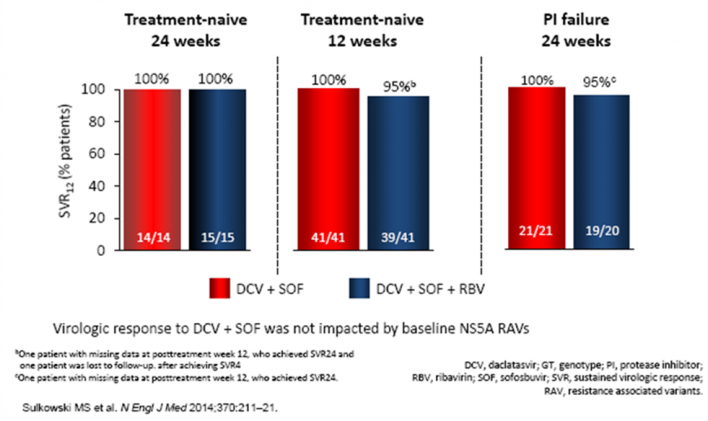Over the past year, there has been a lot of discussion about including ribavirin with direct acting antivirals (DAAs) in the treatment of hepatitis C. In this article, I will show that there is no value at all in combining ribavirin with DAAs in the treatment of hepatitis C. Indeed, the research suggests that adding ribavirin actually reduces the hepatitis C cure rates in many situations.
Background on the use of ribavirin for hep C treatment
Because adding ribavirin definitely improved the effectiveness of interferon-based treatment of hepatitis C there has been the idea that adding ribavirin to sofosbuvir-based treatments such as Epclusa or sofosbuvir + daclatasvir would be a good idea. This despite the fact that ribavirin is a highly toxic drug with many, many potentially dangerous side effects. After several years of monitoring the treatment of hepatitis C patients being treated with the combination of DAAs the evidence is that adding ribavirin to modern hep C treatment has no value in almost every situation. The graph below is from an article published in the Journal of Hepatology in January 2019 called “Real-world effectiveness of daclatasvir plus sofosbuvir and Velpatasvir/Sofosbuvir in hepatitis C genotype 2 and 3.” This study was of over 5,000 patients being treated by the U.S. Department of Veterans Affairs and shows that adding ribavirin actually reduces cure rates in patients with G2 and G3.

This graph shows clearly shows the results of over 5,000 people with hepatitis C being treated with and without ribavirin. The results show that the use of ribavirin actually reduces cure rates. So why use a toxic drug that reduces hep C cure rates?
Hep C treatment with sofosbuvir + daclatasvir with and without ribavirin

This graph from a 2014 study shows that adding ribavirin to a hepatitis C treatment using sofosbuvir + daclatasvir can reduce cure rates by 5%.
There have been numerous studies that show that adding ribavirin to sofosbuvir-based hepatitis C treatment can reduce the cure rates.
The study by Sulkoski et al. also shows a 5% reduction in cure rates for people who added ribavirin to their hepatitis C treatment with sofosbuvir + daclatasvir.
Just how toxic is ribavirin
Below is a long, long list of the side effects of ribavirin and the damage it can do.
The toxicity of ribavirin is not debated. Everyone agrees that ribavirin is a very toxic chemical. However, the argument has always been that the risk of damage from ribavirin’s toxicity is offset by the fact of its antiviral qualities.
This argument cannot be used in the case of hepatitis C treatment because there is no benefit in adding ribavirin to sofosbuvir-based hepatitis C treatment. Indeed there is a distinct disincentive to adding ribavirin to hep C treatment because adding ribavirin reduces cures rates!
So why would anyone consume a toxic drug that reduces their chance of a cure? Why would any doctor prescribe a toxic drug that reduces cure rates?
Hell… I don’t know the answer; maybe it’s just plain ignorance? Maybe it’s a disinformation campaign by the manufacturers of ribavirin?
I don’t know why… it seems crazy to me and it is the reason I am taking the time to write this post, so people know the truth about ribavirin.
Greg’s blog is reprinted with permission, and the views are entirely his. To read the rest of this post, click here.







